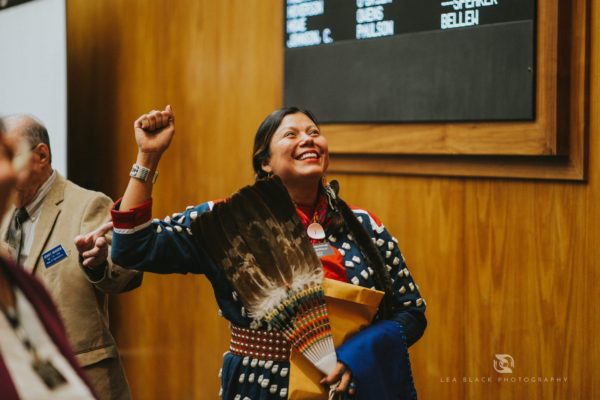
- Details
- By Levi Rickert
BISMARCK, N.D. — Dressed in her traditional regalia, Ruth Buffalo (Mandan, Hidatsa and Arikara Nation) was sworn in as a state representative on Monday, December 3, 2018, at the state capitol in Bismarck, North Dakota. A Democrat, Buffalo will represent the North Dakota District 27 in the House of Representatives, traditionally a Republican district that includes Fargo, North Dakota.
Wearing her regalia was quite appropriate in that Buffalo becomes the first American Indian Democratic woman in the state legislature in North Dakota.
Equipped with three master's degrees: one in management, another in business administration and one in public health, Buffalo knocked on over 6,500 doors to gain votes. Her goal was to resonate with District 27 voters at their doors. She talked about affordable health care issues, which impacts all residents regardless of race or ethnicity.
As fate would have it, she beat the incumbent, former state Rep. Randy Boehning, who sponsored voter ID legislation that sought to suppress the Native vote in North Dakota by requiring each voter provide an ID with a physical address.
Shaunna Thomas, co-founder and executive director of UltraViolet PAC, released the following statement after Buffalo's victory in the midterm election:
“We need more women like Buffalo in our state governments.
More Stories Like This
Native News Weekly (August 25, 2024): D.C. BriefsUS Presidents in Their Own Words Concerning American Indians
DHS Secretary Noem Tells Tribes ICE Does Not Target Native Americans
Native News Online Marks 15 Years of Warrior Journalism
I’m a Minneapolis Postal Worker. This Is What I Saw.
Help us defend tribal sovereignty.
At Native News Online, our mission is rooted in telling the stories that strengthen sovereignty and uplift Indigenous voices — not just at year’s end, but every single day.
Because of your generosity last year, we were able to keep our reporters on the ground in tribal communities, at national gatherings and in the halls of Congress — covering the issues that matter most to Indian Country: sovereignty, culture, education, health and economic opportunity.
That support sustained us through a tough year in 2025. Now, as we look to the year ahead, we need your help right now to ensure warrior journalism remains strong — reporting that defends tribal sovereignty, amplifies Native truth, and holds power accountable.
 The stakes couldn't be higher. Your support keeps Native voices heard, Native stories told and Native sovereignty defended.
The stakes couldn't be higher. Your support keeps Native voices heard, Native stories told and Native sovereignty defended.
Stand with Warrior Journalism today.
Levi Rickert (Potawatomi), Editor & Publisher

